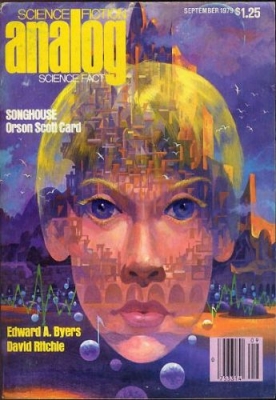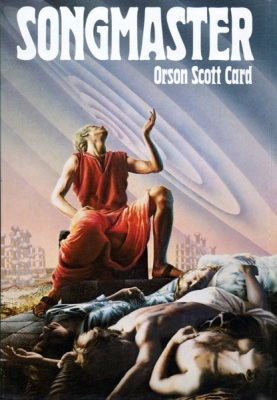The Golden Age of Science Fiction: “Songhouse,” by Orson Scott Card
Analog Award was launched in 1979 for works published in the magazine in the preceding year. The award for Best Novelette has been given every year. The first award, presented in 1979, was presented to “Fireship” by Joan D. Vinge, although Orson Scott Card’s “Mikal’s Songbird” was also up for the award. In 1980, Card won the award for the sequel to “Mikal’s Songbird,” “Songhouse,” which appeared in the September, 1979 issue.
“Songhouse” related the story of a young boy over several years, although the passage of time is vague, as he is being trained in the Songhouse on Tew. Ansset Originally came to the Songhouse as an orphan, although the story does mention that he was a kidnap victim, a background feature which is mostly ignored within the confines of this specific novella. The Songhouse trains singers, who use songs, melodies, and harmonies to communicate on a variety of levels. Ansset is early on pegged to be trained for the highest honor of the house, the position of Songbird, and then to be given over to Mikal, the benevolent dictator of the galaxy.
The story focuses on Ansset’s education, both from the other students and from his assigned teacher, Esste, who in a prologue to the story promised to find someone to serve as a Songbird to Mikal. While a lot of his education takes place within the Songhouse, and Ansset learns, although the lessons remain obscure to the reader, eventually Esste takes him outside the Songhouse to learn the songs of other people. Ansset’s understanding of song is well beyond anything the members of the Songhouse can comprehend and eventually leads to a lengthy standoff between Ansset and Esste as they both try to understand each other.
Card switches between viewpoint characters, occasionally focusing on Ansset, although the character remains somewhat enigmatic. Esste is a more revealed character than the putative protagonist. Other characters who have parts of the story focused on them are Rruk, the student who first greeted Ansset upon his arrival and initiated him into the ways of the Songhouse, and Kya-Kya, a student at the house without the necessary musical talent, but who nevertheless has a major role to play in the story.
“Songhouse” has similarities to Card’s first published story, the 1977 story “Ender’s Game.” Both stories focus on a young boy who has been pulled away from his family and is being trained in a secluded school to be one of the elite, Ender and elite warrior against the buggers, Ansset and elite singer for Mikal. In both cases the messianic aspects of Ender’s primary characters preclude them from having any close relationships with the other students in their respective schools. Ansset interacts with a couple of students, who all gain in social stature from their interactions, but he primarily spends time with, Esste.
Card published “Mikal’s Songbird” in the May, 1978 issue of Analog and followed it up with the prequel, “Songhouse” in the September, 1979 issue of the same magazine. Eventually, Card expanded the story further and published the novel Songmaster in 1980.
The other novelettes considered for the Anlab Award included Larry Niven and Steven Barnes’s collaboration “The Locusts,” Donald Kingsbury’s “The Moon Goddess and the Son,” Michael McCollum’s “Beer Run,” and McCollum’s “Duty, Honor, Planet.”
 Steven H Silver is a sixteen-time Hugo Award nominee and was the publisher of the Hugo-nominated fanzine Argentus as well as the editor and publisher of ISFiC Press for 8 years. He has also edited books for DAW, NESFA Press, and ZNB. He began publishing short fiction in 2008 and his most recently published story is “Webinar: Web Sites” in The Tangled Web. His most recent anthology, Alternate Peace was published in June. Steven has chaired the first Midwest Construction, Windycon three times, and the SFWA Nebula Conference 6 times, as well as serving as the Event Coordinator for SFWA. He was programming chair for Chicon 2000 and Vice Chair of Chicon 7.
Steven H Silver is a sixteen-time Hugo Award nominee and was the publisher of the Hugo-nominated fanzine Argentus as well as the editor and publisher of ISFiC Press for 8 years. He has also edited books for DAW, NESFA Press, and ZNB. He began publishing short fiction in 2008 and his most recently published story is “Webinar: Web Sites” in The Tangled Web. His most recent anthology, Alternate Peace was published in June. Steven has chaired the first Midwest Construction, Windycon three times, and the SFWA Nebula Conference 6 times, as well as serving as the Event Coordinator for SFWA. He was programming chair for Chicon 2000 and Vice Chair of Chicon 7.


I remember liking the a lot when I read it, but haven’t gone back to try rereading. I wonder how it holds up.